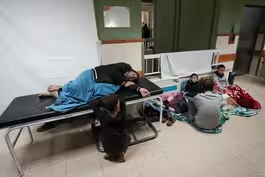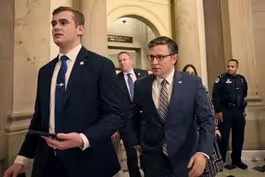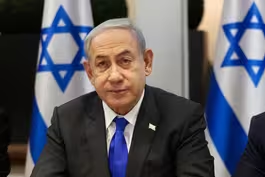
What's in the bill to expand the child tax credit
Clip: 1/18/2024 | 4m 21sVideo has Closed Captions
What's in the bill to expand the child tax credit and how it can help struggling families
The federal child tax credit may soon be expanded as part of an effort by some lawmakers to ensure that more American families can access the benefit. If the proposal becomes law it would gradually increase the credit and allow lower-income families to receive a refundable tax credit for each child. Geoff Bennett discussed more with Sharon Parrott of the Center on Budget and Policy Priorities.
Problems playing video? | Closed Captioning Feedback
Problems playing video? | Closed Captioning Feedback
Major corporate funding for the PBS News Hour is provided by BDO, BNSF, Consumer Cellular, American Cruise Lines, and Raymond James. Funding for the PBS NewsHour Weekend is provided by...

What's in the bill to expand the child tax credit
Clip: 1/18/2024 | 4m 21sVideo has Closed Captions
The federal child tax credit may soon be expanded as part of an effort by some lawmakers to ensure that more American families can access the benefit. If the proposal becomes law it would gradually increase the credit and allow lower-income families to receive a refundable tax credit for each child. Geoff Bennett discussed more with Sharon Parrott of the Center on Budget and Policy Priorities.
Problems playing video? | Closed Captioning Feedback
How to Watch PBS News Hour
PBS News Hour is available to stream on pbs.org and the free PBS App, available on iPhone, Apple TV, Android TV, Android smartphones, Amazon Fire TV, Amazon Fire Tablet, Roku, Samsung Smart TV, and Vizio.
Providing Support for PBS.org
Learn Moreabout PBS online sponsorshipof an effort by some lawmakers to ensure that# more American families can If the proposal becomes law, it would# gradually increase the credit from## $1,600 to $2,000 per child in 2025 and# allow lower-income families to re a refundable tax credit for each child.# Right now, many only earn one tax credit## for all of their children combined.# It would also adjust the credits for## inflation and increase what's available# to those who pay little to no income t Sharon Parrott is the president# of the Center on Budget and Policy## Priorities.
That's a progressive# think tank that studied this deal.
Thanks so much for coming in.
SHARON PARROTT GEOFF BENNETT: S monthly payments that some Americans received# under President Biden' but you still support this proposal.
Why?
SHARON PARROTT: Yes, that's right.
So t the entire credit available to low-income# families, regardless of their earnings.
It## increased the amount of the credit for all# families, and it provided the credit on a## monthly basis.
And that is a very strong policy# that lifted millions of people out of poverty.
And this is smaller than that, there's# no question.
But it still is helping## 16 million children who now don't get# a full child tax credit because th family's incomes are too low.
And# it's going to lift about 500,000,## half-a-million, children out of poverty# in 2025 when it's fully in effect.
So it is an important, meaningful step forward# that provides real help to families today.
And,## yes, we should continue to work# toward a more robust child tax## credit that can do even more# to lift kids out of poverty.
GEOFF BENNETT: I want to ask you about# some critici The Wall Street Journal op-ed board# says the package w parents' incentives to work to# receive the credit since they## wouldn't have to earn as much income# to qualify.
Do you see it that way?
SHARON PARROTT: So let's be clear about what# this proposal does.
It says to a mom with a## couple of kids who's working as a home# health aide or a food server that they## are going to be able to get a little# bit more in their child tax credit.
They are going to be able to get maybe $1,000# more than they get under current law.
That money that she can use to pay a utility bill,# to fix her car so she can keep going to work,## to buy diapers, to buy food at the# grocery store.
This is providing real,## meaningful help to working families# that right now are shut out of the## full child tax credit because# their earnings are too low.
We have an upside-down policy right# now where we give the least help to## the families who need it the most.
Now,# let's be clear.
Under this package,## families still have to have earnings in order# to qualify for the credit.
And the credit,## unfortunately, actually still phases in as# earnings rise.
So families with some of the## lowest incomes will either not qualify for the# credit at all or still qualify for a small credit.
But it is providing meaningful# help to 16 million children.
GEOFF BENNETT: The Committee for a Responsible# Federal Budget in a written statement pr this proposal for finding offsets to# help pay for it, but it also said it## could still set the stage for substantially# more debt over time.
That's a direct quote.
And there's the thought that, given the popularity# of this proposal, that it could become permanent## and cost billions of dollars and add billions# of dollars to the federal deficit over time.
SHARON PARROTT: Yes, let's be clear# about what this proposal does.
There's a series of corporate tax breaks and it's# paired with this modes of the child tax credit.
These provisions in# this package are temporary and, as you said,## are fully paid for.
If Congress comes back to make# them permanent, of course, they would cost more.
And, at that point, Congress should# pay for them.
They should find offsets.## And that's absolutely possible.
If we# ask high-income people and profitable## corporations to pay a fair amount of# tax, we can invest in low-income kids## in ways that pay off for them, their# families and the country as a whole.
GEOFF BENNETT: Sharon Parrott, president of# the Center on Budget and Policy Priorities,## thanks so much for your# insights.
We appreciate it.
SHARON PARROTT: Thank you.
American doctor describes dire humanitarian crisis in Gaza
Video has Closed Captions
Clip: 1/18/2024 | 9m 10s | American doctor who worked in Gaza describes dire humanitarian crisis civilians there face (9m 10s)
Congress passes temporary funding bill to avert shutdown
Video has Closed Captions
Clip: 1/18/2024 | 5m 40s | Congress sends Biden temporary funding bill to avert government shutdown (5m 40s)
DOJ issues review of police response to Uvalde shooting
Video has Closed Captions
Clip: 1/18/2024 | 6m 31s | DOJ issues scathing review of failed police response to Uvalde school shooting (6m 31s)
Health advocates press White House to ban menthol cigarettes
Video has Closed Captions
Clip: 1/18/2024 | 7m 16s | How menthol cigarettes have disproportionately affected Black Americans (7m 16s)
Michele Norris discusses new book 'Our Hidden Conversations'
Video has Closed Captions
Clip: 1/18/2024 | 7m 50s | Michele Norris discusses her new book on how Americans see race and identity (7m 50s)
News Wrap: Netanyahu opposes Palestinian statehood after war
Video has Closed Captions
Clip: 1/18/2024 | 4m 48s | News Wrap: Netanyahu tells U.S. he opposes Palestinian statehood after Gaza war (4m 48s)
Tourism industry responding to women drawn to solo travel
Video has Closed Captions
Clip: 1/18/2024 | 6m 30s | Why women are drawn to solo travel and how the tourism industry is responding (6m 30s)
Providing Support for PBS.org
Learn Moreabout PBS online sponsorship
- News and Public Affairs

FRONTLINE is investigative journalism that questions, explains and changes our world.

- News and Public Affairs

Amanpour and Company features conversations with leaders and decision makers.












Support for PBS provided by:
Major corporate funding for the PBS News Hour is provided by BDO, BNSF, Consumer Cellular, American Cruise Lines, and Raymond James. Funding for the PBS NewsHour Weekend is provided by...






